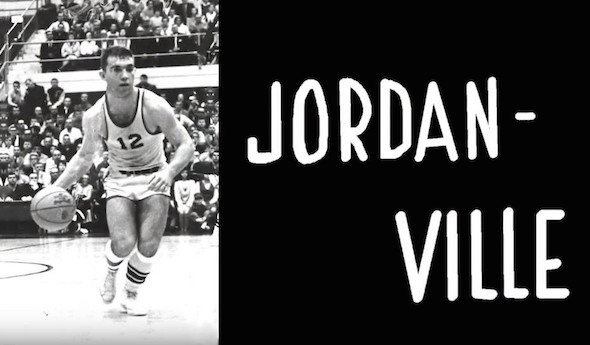
Film Fills In Picture of 'Fennville Flash'
By
Ron Pesch
MHSAA historian
December 28, 2017
We’ve been here before, but not in this way.
The last time was for a retrospective, covering one of the most impressive and awe-inspiring prep careers in Michigan high school history. That time was in print, and included a handful of still images that tried to illustrate the unbelievable.
But this time, the story is in documentary form. It’s woven together from grainy, scratched, faded silent film, a format of capturing memories familiar to thousands of people from generations past, as well as a series of modern-day high-resolution interviews.
Here, the basketball life of the athlete known as the “Fennville Flash” delivers on many levels. Yes, there is a Richie Jordan.
JordanVille, a documentary by John Mooy & Anne Colton, recalls a time when legend spread via word of mouth, newsprint and AM radio.
While it’s hard to comprehend for many today, the exploits of our athletic heroes were formed by “poets in the press box” who sat with pencil and paper, a typewriter, a microphone or a telephone, and described to their audience what they witnessed. On the receiving end, readers and listeners conjured up visualizations based on the facts, phrases and superlatives designed to create an image.
“Traveling left to right on your radio dial” helped listeners feel they were a member of the crowd, seated in the stands, in on the action and a witness to the mayhem. “Packed to the rafters,” reminded fans the importance of what was happening. An exciting game, presented by those with skill, created an event you longed to see. If a broadcast couldn’t be picked up on a transistor or tube radio, the final result might not be known, at the earliest, until the following day’s newspaper arrived.
I’ve told Jordan’s story via the MHSAA before; how he latched on to athletic training, weights and repetition to mold himself into a well-rounded athlete, able to leap to heights unexpected for a kid with a 5-foot-7 frame. The tales of his unfathomable accomplishments slowly leaked beyond the city limits of Fennville into Kalamazoo and greater Southwestern Michigan, then to Detroit. When Detroit Free Press writer Hal Schram relayed Jordan’s feats, the secret traveled across the state and beyond its drawn borders.
From there the legend of Jordan’s accomplishments grew. In Fennville, as in many small towns across the country, the city shut down when a game was played. The Jordan story was so enticing that thousands would travel vast distances to see him play with their own eyes. Today, his single season scoring average of 44.4 points per game during the 1964-65 campaign still remains the top mark in the MHSAA record book.
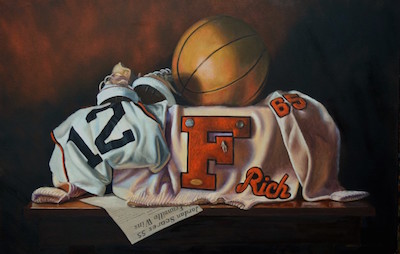 JordanVille runs just shy of a half hour. Contained within is insight into the athlete that is challenging to relay in print form. Thanks to access to home movies and a series of interviews with Jordan, former teammates, past opponents and his high school coach, the determination, dedication and drive of a kid who wouldn’t let physical size be a deterrent from achievement radiates from the screen. On display is small town America at its finest, and perspective formed over 50+ years.
JordanVille runs just shy of a half hour. Contained within is insight into the athlete that is challenging to relay in print form. Thanks to access to home movies and a series of interviews with Jordan, former teammates, past opponents and his high school coach, the determination, dedication and drive of a kid who wouldn’t let physical size be a deterrent from achievement radiates from the screen. On display is small town America at its finest, and perspective formed over 50+ years.
For Mooy, it completes a filmmaking journey started six years ago. But the story of Jordan, in his eyes, date back to his school days. Mooy first heard about Jordan as a 7th-grader from a math teacher. A second-team all-St. Joseph Valley League selection, Mooy played at Marcellus High School and scrimmaged against Jordan and the Fennville Blackhawks.
He couldn’t believe his eyes.
“Everyone wanted to see this kid play,” said Mooy in 2011. “He was the first high school player I saw sign an autograph.
Today, with the interviews complete, and the film ready for viewing, Mooy sees more than just a sports story:
“With the benefit of years now passed, I look at the Rich Jordan story with a new respect. JordanVille created a place that was welcoming no matter who you were, or what color your skin happened to be. It was the 1960s. Rich was growing up Jewish, the Civil Rights Movement was in full swing, and the Vietnam War was on everyone's mind. And in Fennville, Michigan, from 1961 to 1965, the Jordan high school years, there were lessons beyond sports being learned by everyone that would last a lifetime. The Jordan household, under the guidance of (his parents) Tuffy and Sylvia Jordan, is where the story begins."
The film speaks of a time that has departed. Competition for our attention was less focused; phones hung on walls or sat on tabletops, communities were tighter, the training table featured peanut butter and chocolate milk instead of protein powder. A city could easily be renamed for a day.
The film also reminds us that those days were far from perfect.
If all goes as planned, the public will see the finished product come the flip of the calendar. In West Michigan, JordanVille is scheduled to show on New Year’s Day at 6 p.m. on WGVU, and will repeat on WGVU-Life at 7:30 p.m., Friday, Jan. 5.
Seek it out, and spread the word, just like in days of old.
 Ron Pesch has taken an active role in researching the history of MHSAA events since 1985 and began writing for MHSAA Finals programs in 1986, adding additional features and "flashbacks" in 1992. He inherited the title of MHSAA historian from the late Dick Kishpaugh following the 1993-94 school year, and resides in Muskegon. Contact him at [email protected] with ideas for historical articles.
Ron Pesch has taken an active role in researching the history of MHSAA events since 1985 and began writing for MHSAA Finals programs in 1986, adding additional features and "flashbacks" in 1992. He inherited the title of MHSAA historian from the late Dick Kishpaugh following the 1993-94 school year, and resides in Muskegon. Contact him at [email protected] with ideas for historical articles.
PHOTOS: (Top) Richie Jordan runs Fennville's offense during his thrilling high school career in the 1960s. (Middle) Jordan memorabilia, as captured by Bill Williams.
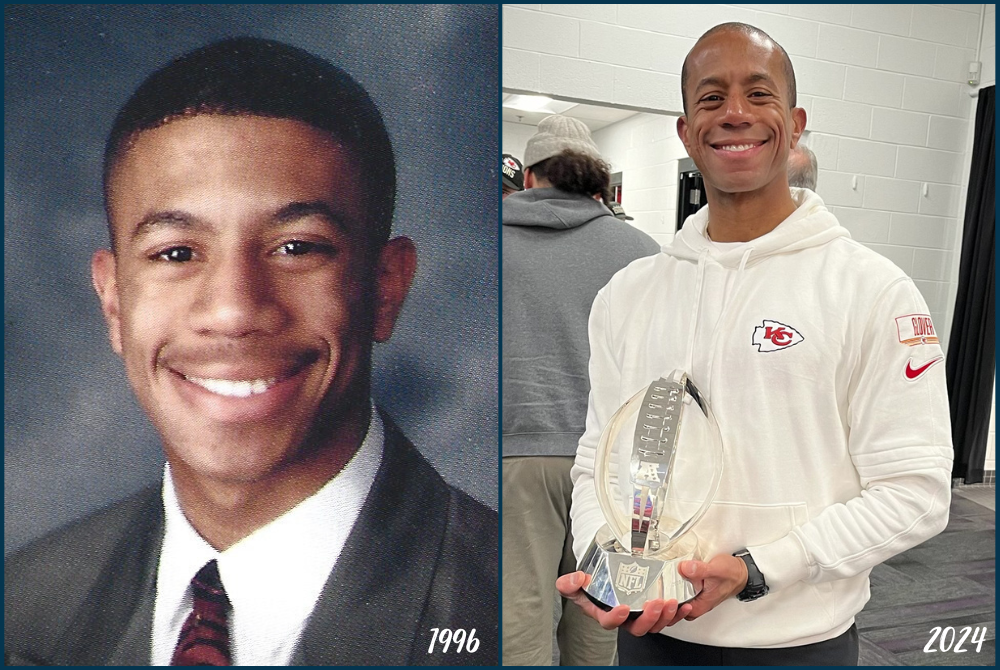
MCC's Glover Fills Key Role as Athletic Trainer for Super Bowl Champions
By
Tom Kendra
Special for MHSAA.com
August 6, 2024
David Glover never had the glamour role – and didn’t even play the glamour sport – during his high school days at Muskegon Catholic Central.
 MCC is known statewide as a football powerhouse that ranks third in state history with 12 MHSAA Finals championships during the playoff era. But basketball was Glover’s sport of choice, and his specialty didn’t show up in the box score.
MCC is known statewide as a football powerhouse that ranks third in state history with 12 MHSAA Finals championships during the playoff era. But basketball was Glover’s sport of choice, and his specialty didn’t show up in the box score.
“I was the defensive stopper,” explained Glover, who graduated from MCC in 1996. “I was always the guy that Coach (Greg) Earnest would put on the other team’s best scorer. I took a lot of pride in that.”
Glover continues to be the ultimate team player, only now his role is the first assistant athletic trainer for the Kansas City Chiefs, who are aiming to three-peat this season as Super Bowl champions.
“As the team and the goals have grown, so have I,” said Glover, who has been on the Chiefs’ training staff for the past 18 years. “The job is the same, which is getting the players onto the field and back onto the field after injuries so that they can perform at their highest level. I have become more comfortable and experienced in that role.”
Glover broke into the NFL as an athletic training intern with the New York Jets in 2004. He came to Kansas City in 2006 when Jets head coach Herman Edwards took the KC job, bringing Glover and several other members of the training staff with him.
Glover quickly fell in love with the Chiefs’ famous family-first culture, along with the area’s world-famous barbecues. He also met his future wife, Jera.
He is known as a tireless worker and student of his craft, which has allowed him to steadily move up to his current position as first assistant athletic trainer on the Chiefs’ five-member training staff, second only to Rick Burkholder, the vice president of sports medicine and performance.
Glover’s skills also have caught the attention of his colleagues across the NFL, who awarded him the 2022 Tim Davey AFC Assistant Athletic Trainer of the Year Award – given annually to someone who represents an unyielding commitment, dedication and integrity in the profession of athletic training.
Glover said a big reason for his success in his profession can be traced back to high school.
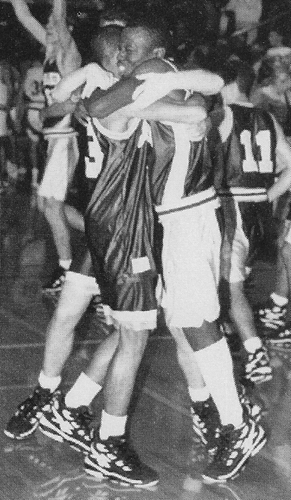 “Playing sports at MCC, especially for a smaller school, gave me such a sense of camaraderie, teamwork and a family outside of my normal family,” said Glover, the son of David and Lyndah Glover. “Those teammates energized me to be my best.
“Playing sports at MCC, especially for a smaller school, gave me such a sense of camaraderie, teamwork and a family outside of my normal family,” said Glover, the son of David and Lyndah Glover. “Those teammates energized me to be my best.
“There’s no doubt that some of the lessons that I learned playing sports in high school help me out in my job.”
Glover also ran track for the Crusaders – competing in the long jump, 200 meters, 400 meters and various relays – and said he enjoyed himself, even though he ran track initially as a way to stay in shape for basketball.
The highlight of his MCC basketball career came his senior year, when the underdog Crusaders captured a Class C District championship.
Growing up in Muskegon and close to Lake Michigan, Glover thought he would become a marine biologist someday – that is, until he suffered an injury during his senior basketball season.
Glover went up for a block and actually pinned the opponent’s shot against the backboard. However, the shooter inadvertently took his legs out on the play, causing him to crash violently to the court and lose feeling in his right leg for about 10 seconds.
The injury to his hip flexor put him on crutches for two weeks and off the court total for about a month, which he said “felt like the end of the world” at the time.
But the injury led him into rehab with Brian Hanks, a 1988 MCC graduate who was back working at his alma mater as an athletic trainer through Mercy Hospital.
Glover and Hanks turned out to be a perfect match. Glover was naturally curious about the entire process and wanted to know the “why” of his rebab program. Hanks recognized Glover’s interest in how the human body works and encouraged him to consider studying athletic training in college.
“God works in mysterious ways,” said Glover. “I was devastated when I got injured, but that experience opened my eyes to a whole new career. I wanted to learn everything I could about the human body and how it works.
“Looking back, the injury was a blessing in disguise. I wouldn’t change anything at all.”
Glover followed in Hanks’ footsteps and attended Central Michigan University, spending countless hours in the training room working with athletes in every sport – from football to track to gymnastics – graduating with a degree in health fitness and exercise science.
He said a huge inspiration in his career was CMU professor Dr. Rene Shingles, who in 2018 became the first African-American woman to be inducted into the National Athletic Trainers Association Hall of Fame. Shingles encouraged Glover to continue his studies at Seton Hall University in New Jersey, where he earned his master’s of science in athletic training.
He got his break into the NFL with his internship with the Jets, and his work ethic has kept him there for the past 20 years.
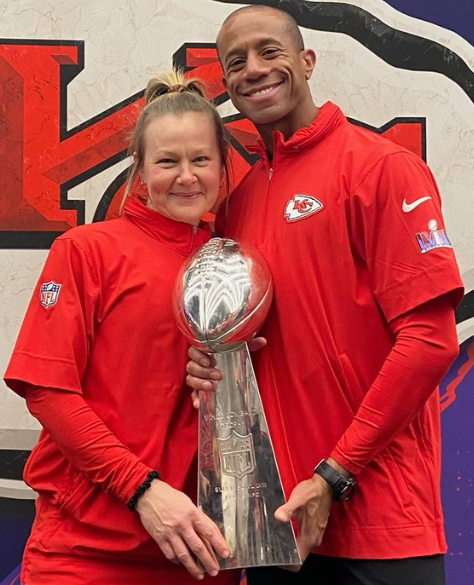 “If there are high school kids out there reading this, I guess I would tell them that there are a lot of different avenues to get to the NFL or the NBA,” Glover said. “I’m a perfect example. I didn’t even play high school football, but through athletic training I have been part of three Super Bowls.”
“If there are high school kids out there reading this, I guess I would tell them that there are a lot of different avenues to get to the NFL or the NBA,” Glover said. “I’m a perfect example. I didn’t even play high school football, but through athletic training I have been part of three Super Bowls.”
The Chiefs, who won their first Super Bowl way back in 1970, would have to wait 50 years (until 2020) to win their next one. But Kansas City now has won three Super Bowls in five years, adding titles in 2023 and 2024.
“To have these kind of experiences, and to be able to share so much of it with my family, is really a dream come true,” said Glover, 45, who said his ultimate goal is to become the head athletic trainer for an NFL team.
“I am always open to see what opportunities God has for me and what doors he opens.”
More immediately, with the start of training camp last month, Glover is back to his seven-day-a-week schedule, sharing the organization’s goal of making it to the Super Bowl for the third consecutive season.
Glover has worked with all of the Chiefs star players at some point, including star quarterback Patrick Mahomes, who he calls “a great, humble man.”
But perhaps the player he has worked with most is standout tight end Travis Kelce.
Kelce, who has become a huge name outside of football as the boyfriend of pop sensation Taylor Swift, injured his knee during his rookie preseason in 2013, sidelining him for the entire year. Glover was assigned to Kelce for his rehab.
With Glover’s daily help, Kelce was able to get back on the field the following year and emerged as a star, earning him the 2014 NFL Ed Block Courage Award as a model of inspiration, sportsmanship and courage.
After winning the award, Kelce invited Glover (he calls him “DG”) and his wife to attend the award ceremony with him in Baltimore.
“That was a huge honor for me, and I was blown away,” said Glover. “I look at it that I was just doing my job. He entrusted and believed in me throughout the process, and it worked out great.”
2024 Made In Michigan
August 1: Lessons from Multi-Sport Experience Guide Person in Leading New Team - Read
July 30: After Successful 'Sequel,' Suttons Bay's Hursey Embarking on Next Chapter - Read
July 24: East Kentwood Run Part of Memorable Start on Knuble's Way to NHL, Olympics - Read
July 22: Monroe High Memories Remain Rich for Michigan's 1987 Mr. Baseball - Read
July 17: Record-Setting Viney Gained Lifelong Confidence at Marine City - Read
July 11: High School 'Hoop Squad' Close to Heart as Hughes Continues Coaching Climb - Read
July 10: Nightingale Embarking on 1st Season as College Football Head Coach - Read
June 28: E-TC's Witt Bulldozing Path from Small Town to Football's Biggest Stage - Read
PHOTOS (Top) At left, David Glover as a senor during the 1995-96 school year at Muskegon Catholic Central, and at right Glover shows the AFC Championship trophy after Kansas City's 17-10 win at Baltimore on Jan. 28. (Middle) Glover, left, hugs teammate Doug Dozier after a victory over rival Muskegon Mona Shores in 1995-1996 basketball season opener. MCC finished 17-7 and a District champion. (Below) Glover poses with this year's Super Bowl Championship trophy alongside fellow Chiefs athletic trainer Julie Frymyer. (Trophy photos courtesy of David Glover; 1996 photos courtesy of the MCC yearbook.)

